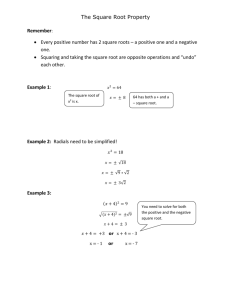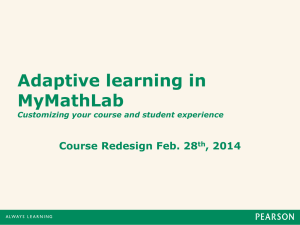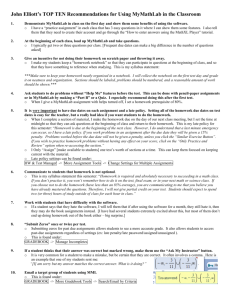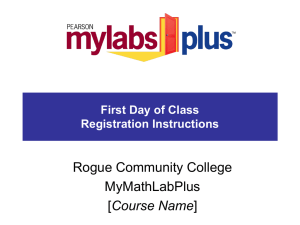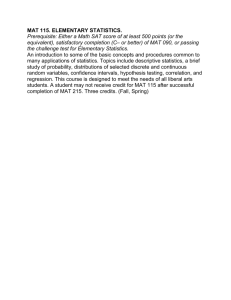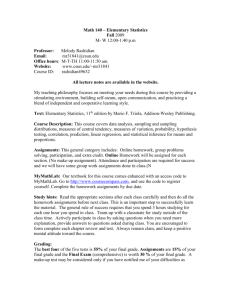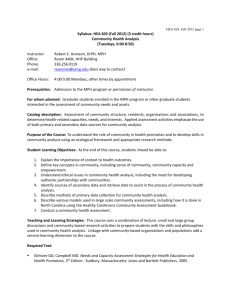Math 120-01D WTX: Calculus for Business and Social Sciences
advertisement
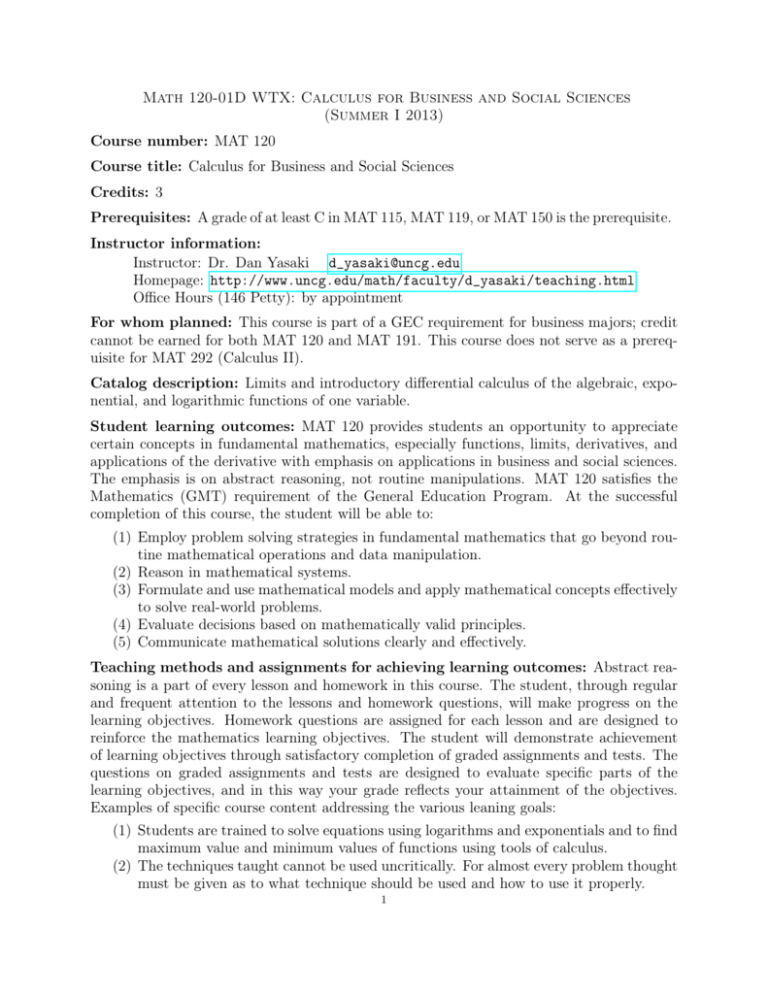
Math 120-01D WTX: Calculus for Business and Social Sciences (Summer I 2013) Course number: MAT 120 Course title: Calculus for Business and Social Sciences Credits: 3 Prerequisites: A grade of at least C in MAT 115, MAT 119, or MAT 150 is the prerequisite. Instructor information: Instructor: Dr. Dan Yasaki d_yasaki@uncg.edu Homepage: http://www.uncg.edu/math/faculty/d_yasaki/teaching.html Office Hours (146 Petty): by appointment For whom planned: This course is part of a GEC requirement for business majors; credit cannot be earned for both MAT 120 and MAT 191. This course does not serve as a prerequisite for MAT 292 (Calculus II). Catalog description: Limits and introductory differential calculus of the algebraic, exponential, and logarithmic functions of one variable. Student learning outcomes: MAT 120 provides students an opportunity to appreciate certain concepts in fundamental mathematics, especially functions, limits, derivatives, and applications of the derivative with emphasis on applications in business and social sciences. The emphasis is on abstract reasoning, not routine manipulations. MAT 120 satisfies the Mathematics (GMT) requirement of the General Education Program. At the successful completion of this course, the student will be able to: (1) Employ problem solving strategies in fundamental mathematics that go beyond routine mathematical operations and data manipulation. (2) Reason in mathematical systems. (3) Formulate and use mathematical models and apply mathematical concepts effectively to solve real-world problems. (4) Evaluate decisions based on mathematically valid principles. (5) Communicate mathematical solutions clearly and effectively. Teaching methods and assignments for achieving learning outcomes: Abstract reasoning is a part of every lesson and homework in this course. The student, through regular and frequent attention to the lessons and homework questions, will make progress on the learning objectives. Homework questions are assigned for each lesson and are designed to reinforce the mathematics learning objectives. The student will demonstrate achievement of learning objectives through satisfactory completion of graded assignments and tests. The questions on graded assignments and tests are designed to evaluate specific parts of the learning objectives, and in this way your grade reflects your attainment of the objectives. Examples of specific course content addressing the various leaning goals: (1) Students are trained to solve equations using logarithms and exponentials and to find maximum value and minimum values of functions using tools of calculus. (2) The techniques taught cannot be used uncritically. For almost every problem thought must be given as to what technique should be used and how to use it properly. 1 (3) Students must assess realistic financial and business problems presented in ordinary English language form and then apply appropriate mathematical models to them. Solving these models is supposed to give a prediction about the real-world behavior, such as the optimal pricing (or production level) of a product, the likely outcome of an investment, etc. (4) The mathematical models taught in the course cannot be used uncritically as they often do not apply universally. Some care must be taken to see that sensible realworld conclusions are obtained. (5) Extensive online homework is given to test this material, a total of 23% of the grade for the course. Problems given here are largely free-response and the student must be able to solve the problem on his own and enter the answer on his own in mathematical form. Problems are randomly generated for each individual. Test questions are multiple choice but specifically designed to catch common errors in reasoning that lead to incorrect answers. Evaluation and grading: Semester averages are rounded to the nearest point, and letter grades are assigned on a 10 point scale. A+ : 97–100 A : 93–96 A− : 90–92 B+ : 87–89 B : 83–86 B− : 80–82 C+ : 77–79 C : 73–76 C− : 70–72 D+ : 67–69 D : 63–66 D− : 60–62 F : 0 – 59 Homework (8%): We will use the online homework system at http://www.MyMathLab.com. Graded assignments are found in MyMathLab under the HOMEWORK tab. Due dates are posted with each assignment and will not be extended. The online questions are algorithmic iterations of textbook exercises. If you do not know how to do a problem you may get help by clicking on Help Me Solve It, View an Example or Textbook on the right side of the problem. Some problems have related video instruction. Homework assignments can be repeated an infinite number of times before the due date. Your lowest homework grade will be dropped when calculating your course average. Quizzes (15%): For each of the online HW assignments, there is an associated online quiz that must be completed. You must score at least 70% on the associated online homework in order to begin the quiz. (If you do not score at least 70% on the associated homework, you will not be able to take the associated quiz which will result in you earning a 0% on that quiz.) The quizzes are in MyMathLab under the QUIZZES tab. Due dates are posted with each quiz and will not be extended. Quizzes are timed 60 minutes and can be submitted up to 3 times. The highest score of all attempts will be the recorded grade for that particular quiz. It is recommended that you take a quiz more than once. Your lowest quiz grade will be dropped when calculating your course average. Regression assignment (2%): The Regression Assignment is a special assignment worth 2% of the semester grade. It will require the use of Excel or similar software and should be submitted via email by May 28, 2013. Specific instructions can be found on the assignment. 2 Tests (15% each): The three tests are on campus in Petty 136. Each test consists of 20 multiple choice questions. The tests are timed 50 minutes. Students must arrange to take tests at the Office of Disability Services for extended timing or other special needs. Test 1 (Monday, May 20, 2013, 4:00–4:50 PM): Chapters 1–2 Test 2 (Wednesday, May 29, 2013, 4:00–4:50 PM): Chapter 3 Test 3 (Wednesday, June 12, 2013, 4:00–4:50 PM): Chapters 4–5 Final exam (30%): The Final exam is cumulative, covering selected sections from Chapters 1–5. The exam is Friday, June 14, 2013, 2:00-5:00 PM in Petty 136. All submitted assignments should be the work of the individual student. See the Academic Integrity Policy section for details. For technical support with MyMathLab, visit http://247pearsoned.custhelp.com/ or call 1-800-677-6337. Required text: Barnett, Ziegler, Byleen, Calculus for Business, Economics, Life Sciences and Social Sciences, 12th edition, Prentice Hall, 2011. You are not required to buy this textbook. Instead you are required to register for this class on http://www.MyMathLab.com which gives you access to homework and quizzes, to the electronic version of the textbook, class announcements, grades, etc. You may pay for your registration directly at MyMathLab.com, or you may shop around for the “MyMathLab access kit” which is available at most bookstores that carry textbooks. See the last page for details. You must use your UNCG email address when you register in MyMathLab and the same user name that you use for Blackboard. Class announcements, syllabus, lecture notes, textbook in electronic format with videos, grades, etc., will be there. All students are expected to be registered in MyMathLab by May 14, 2013. 3 Topical outline: Section Material covered 1. 1.1 1.2 2. 2.1 2.2 2.3 2.4 2.5 2.6 3. 3.1 3.2 3.3 3.4 3.5 3.7 4. 4.1 4.2 4.3 4.4 5. 5.1 5.2 5.4 5.5 5.6 Linear Equations and Graphs Linear Equations and Inequalities Graphs and Lines Functions and Graphs Functions Elementary Functions: Graphs and Transformations Quadratic Functions Polynomial and Rational Functions Exponential Functions Logarithmic Functions Limits and Derivative Introduction to Limits Infinite Limits and Limits at Infinity Continuity The Derivative Basic Differentiation Properties Marginal Analysis in Business and Economics Additional Derivative Topics The Constant e and Continuous Compound Interest Derivatives of Exponential and Logarithmic Functions Derivatives of Products and Quotients The Chain Rule Graphing and Optimization First Derivative and Graphs Second Derivative and Graphs Curve-Sketching Techniques Absolute Maxima and Minima Optimization Academic Integrity Policy: Each student is required to abide by the Academic Integrity Policy on all work submitted for the course. By submitting an assignment or test online, you attest I have abided by the UNCG Academic Integrity Policy on this assignment. More information can be found at http://sa.uncg.edu/handbook/academic-integrity-policy/. Student Study Program: As a student in this course, you have the opportunity to participate in the Student Study Program (SSP), which is one of the four programs housed in the Student Success Center located in the McIver Building. The Student Study Program is designed to offer additional academic support for students enrolled in large classes that have proven to be historically difficult. The purpose of the Student Study Program (SSP) is to provide undergraduate students with the opportunity to form collaborative study groups of up to 4 students. Students will be 4 matched by the program coordinator with other students in the same course and section number. To sign up or to learn more about SSP, go to http://success.uncg.edu/ssp/. If you have further questions, you may also contact the Coordinator of the Student Study Program, Jae Haley, at ssp@uncg.edu. Additional information: (1) Students with Disabilities: If you have a documented disability and wish to discuss academic accommodations, please contact me as soon as possible. You are responsible for contacting the ODS in 215 EUC (334-5440, http://ods.dept.uncg.edu/) and for arranging the necessary forms for me to fill out and sign. Without these forms the services provided by the ODS will not be available. ODS cannot schedule or reschedule tests without consent from the instructor. (2) Due to the compressed nature of the course, late assignments will not be accepted. Make-up tests and final exam will be given only if you receive prior approval for a valid excuse by contacting me at least one week in advance. (3) Copyright Policy: Selling or purchasing notes from classes for commercial gain is a violation of the UNCG Copyright Policy. http://policy.uncg.edu/copyright/ Any student who sells notes taken in class for commercial gain, or who purchases notes taken by another student for commercial gain, is in violation of this policy and, by extension, is committing a violation of the Student Code of Conduct. http://sa.uncg.edu/handbook/student-code-of-conduct/ (4) Email Policy: All email correspondence should be made using your UNCG email account. You must check your email regularly for updates and announcements. (5) Any scientific calculator below TI-89 is acceptable. Graphing calculators are allowed but not required. Calculators that perform symbolic computations are not allowed. Anyone using a graphing calculator is responsible for learning how to use it; instructions for graphing calculator are not part of the class curriculum. 5 MyLab / Mastering Student Registration Instructions To register for MAT 120 (Summer 2013): 1. Go to pearsonmylabandmastering.com. 2. Under Register, click Student. 3. Enter your instructor’s course ID: yasaki37096, and click Continue. 4. Sign in with an existing Pearson account or create an account: · If you have used a Pearson website (for example, MyITLab, Mastering, MyMathLab, or MyPsychLab), enter your Pearson username and password. Click Sign In. · If you do not have a Pearson account, click Create. Write down your new Pearson username and password to help you remember them. 5. Select an option to access your instructor’s online course: · Use the access code that came with your textbook or that you purchased separately from the bookstore. · Buy access using a credit card or PayPal. · If available, get 17 days of temporary access. (Look for a link near the bottom of the page.) 6. Click Go To Your Course on the Confirmation page. Under MyLab / Mastering New Design on the left, click MAT 120 (Summer 2013) to start your work. Retaking or continuing a course? If you are retaking this course or enrolling in another course with the same book, be sure to use your existing Pearson username and password. You will not need to pay again. To sign in later: 1. Go to pearsonmylabandmastering.com. 2. Click Sign In. 3. Enter your Pearson account username and password. Click Sign In. 4. Under MyLab / Mastering New Design on the left, click MAT 120 (Summer 2013) to start your work. Additional Information See Students > Get Started on the website for detailed instructions on registering with an access code, credit card, PayPal, or temporary access.
